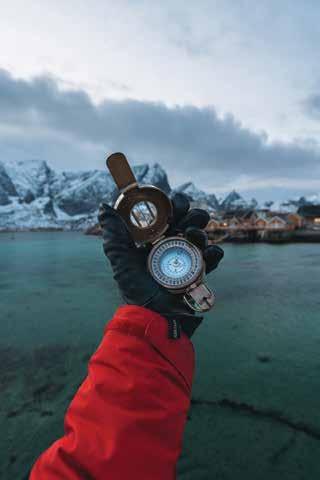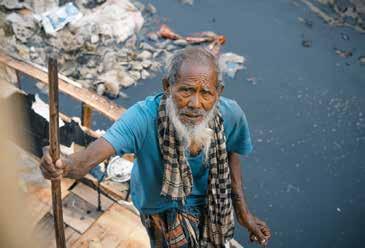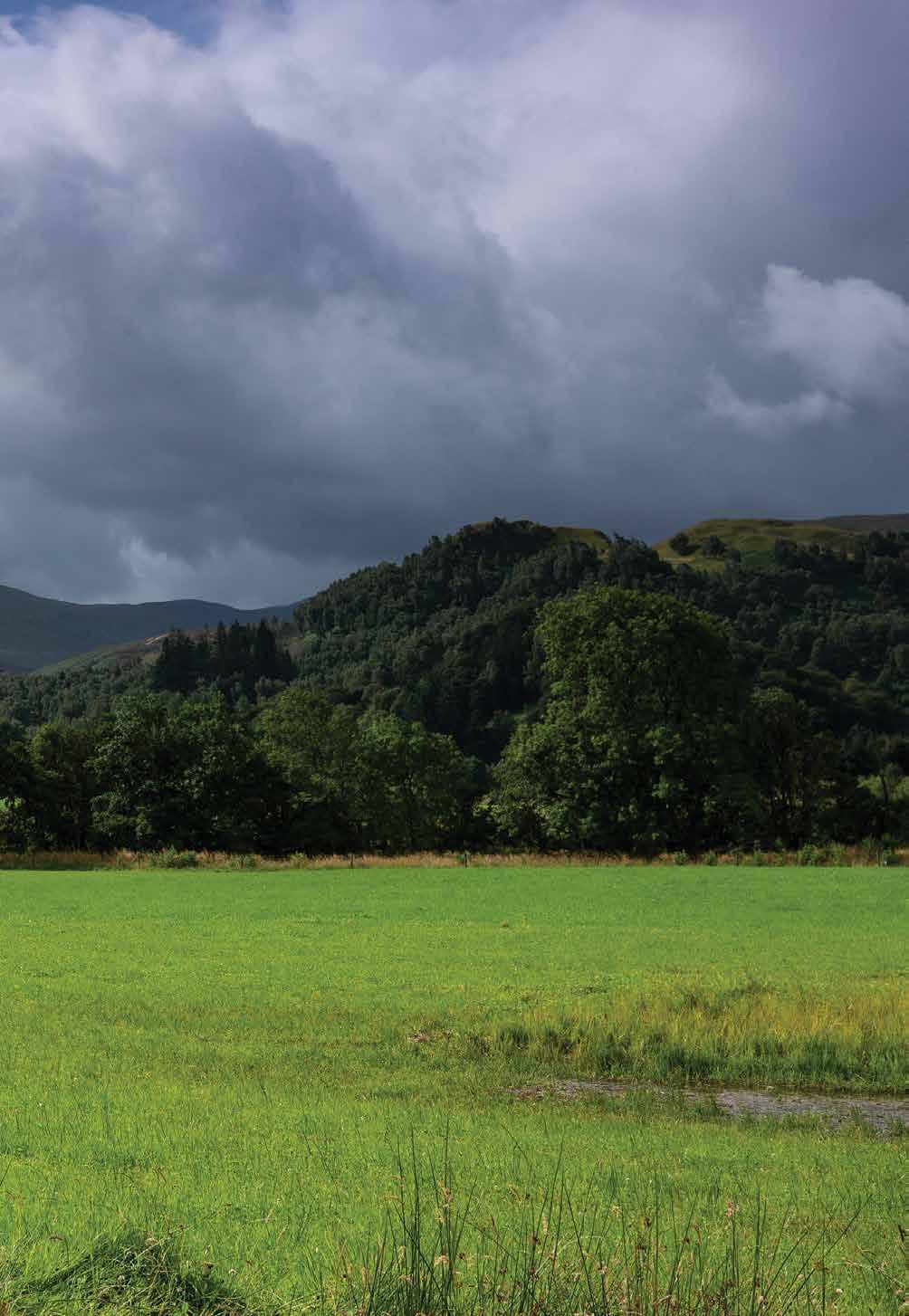
8 minute read
Take Photos, Leave Footprints


Background: The Scottish Highlands
Photo: Lauren Fleming instagram.com/lfbphotography
Staying Healthy When Traveling
It’s one of the worst-case travel scenarios: You save up for months, book a life changing trip, pack your bags, travel halfway across the world and promptly fall foul of a mystery illness that wipes you out for days. From poor food hygiene to communicable diseases, there are a multitude of health-related reasons that can turn a year of holiday planning into a health-related disaster; not least in the current pandemic environment. To help you avoid succumbing to this exact scenario, I’ve rounded up some of the ways you can try and remain happy and healthy on vacation.

Water Consumption
Drink Bottled Water:
It may not be the most environmentally friendly suggestion, but drinking bottled water is good way to avoid some of the nasty bacteria you’ll often find in tap water in countries with questionable water supply. If you do have to fall back on bottled water then ensure that the seal remains clearly unbroken and, ideally, the cap is plastic wrapped and intact. I’ve seen evidence on several occasion during my travels of stores refilling used bottles with tap water and selling them as bottled water. Buyer beware!
Water Purification Options: A more environmentally friendly, but not always practical, option is to consider using one of the multiple water purification options to purify local tap water. When I first started traveling this typically meant resorting to boiling water twice or using purification tablets such as chlorine, chlorine dioxide, or iodine (the latter is no longer recommended). However, over the past decade a whole raft of filtration options have entered the market, including the much heralded LifeStraw, the Steripen, or the Water-To-Go bottle.
Avoid Salads: Not all water consumption issues relate to drinking it. Salads (and fruit) washed in tap water can be equally problematic. If possible, I would refrain from eating salad in countries that have questionable tap water supply unless you have personally seen that it was cleaned utilizing a filtered or purified water source.
Don’t Take Ice in your Drinks: You should assume, unless specifically told otherwise, that all ice is made using tap water that hasn’t been filtered or purified and is therefore no different to directly drinking tap water. Luxury hotels will often use filtered/purified water; however, you should certainly ask before you make this assumption.
Clean Cans: Finally, if you’re swapping out water consumption for soft drinks sold in cans, then make sure that you wipe the cans with anti-bacterial wipes before you drink directly from them. Cans could have been sitting out for any length of time and may have been exposed to all manner of bacteria before they reach your mouth!
Food Intake Avoid Buffets: Buffets are notorious breeding grounds for E.Coli, Salmonella and Listeria. Serving utensils are often dirty, food is kept at inappropriate temperatures, meals can sit for hours before reaching your plate, and crosscontamination between foodstuffs is rife….and I haven’t even begun mentioning how unsanitary the average buffet patron is when it comes to picking things up with their hands, putting things back, and coughing/sneezing over food not protected by sneeze guards. Summary - leave buffets well alone!
Be Careful with Street Food: I love street food! Until a few years ago if there was anything I could guarantee it was that, regardless of where in the world I was, I would be sampling something from a street food vendor. Then I got hit hard by food poisoning after eating a dodgy chicken empanada in Colombia. After 3 days locked in a hotel room, I have reevaluated my take on street food. I now take a much closer look at raw food storage, avoid reheated foods, ensure food is piping hot throughout and like to see the vendor is practicing some sort of food hygiene. I’m definitely not saying avoid street food (I could never do that). Just make sure you pay closer attention to hygiene.
Reconsider Raw Food: When you can’t vouch for the safe storage of raw food prior to consumption, especially things like raw seafood, you’re asking for trouble. You should ideally be sticking to thoroughly cooked and steaming hot food – only that way can you mitigate the risk of consuming bacteria.
Play it Safe: Sometimes, and despite one of the main benefits of travel being to sample other cultures, it pays to play it safe and stick to the food you know. By doing so your stomach can recover from unusual ingredients, spices and bacteria. Whilst traveling around Vietnam this was a tactic I often deployed. One day I’d be eating giant rat that had moments ago been presented to me in a bloodied plastic bag, and the next I’d revert to the classic staple of room service pizza. It’s a fine balancing act that often pays off!

Sun Exposure
The vast majority of my advice on sun exposure results from the fact that I’m a red head! Based on that one mere fact I have more sun-related travel illness stories than the average camper. My guidance is based on 2 particular incidents:
On a recent trip to Africa I wild camped out in the bush overnight. Over the course of the evening I consumed way too much vodka and rum around the campfire. In the morning we proceeded on a 7-mile hike in 100-degree heat in search of black rhino without adequate water or sunscreen (yes, I know, stupid). When we finally got back in our vehicle I proceeded to full-body cramp. My body involuntarily curled up in a ball, I lost the ability to move my hands, and could no longer speak. Long story short, extreme dehydration had set in. Thankfully I had others around to help as we sped back to civilization. I was then dumped, fully clothed, into a shower with a water bottle in my hand.
On a trip to Samoa I spent half a day snorkeling along the coralline in search of sea turtles (which I spotted, so it wasn’t a complete disaster). It was an extremely overcast day, so I thought the little sunscreen I had slathered on my pasty white British skin was adequate.
It. Was. Not!
After a few hours of shallow diving amongst the coral reef I headed back to the shoreline. I thought I looked a little pink but wasn’t too worried. After all, I’d doused myself in sunscreen!
Later that night the true extent of what had transpired was revealed. Unwittingly I had used EXPIRED sunscreen and not nearly enough of it! My entire back, legs, and arms were red raw to the point that I couldn’t move without enduring searing pain. Flying home (a mere 26 hours in the air back to London) was pure agony. It took weeks to recover.
Based on these two incidents alone, you should do the following to avoid sun-related illness:
Use High SPF Sunscreen: The higher the better in my opinion. Is a suntan worth the possibility of illness? You should also make certain that sunscreen hasn’t expired. Many bottles contain an expiration date. If yours doesn’t then write a purchase date on it. Sunscreen is only required to retain its original SPF strength for three years. After that it won’t necessarily be as effective.
Hydrate: Heat exhaustion and dehydration can be serious. Carry enough water with you to remain hydrated. The consequences of not drinking enough water can be serious.
Keep Cool: Avoid the risk of heat exhaustion and sun stroke by remaining as cool as possible. Use fans and water misters if air conditioning isn’t available and move to shade rather than sit out directly in the sun at the heat of midday.
Cover Up: Even better than high SPF sunscreen is to cover up. Long sleeved clothing with built-in SPF coverage is an excellent idea. Hats and sun scarves may also be necessary if you’re fair skinned or generally prone to burning.
Disease Avoidance Wash your Hands: Having had the “wash your hands” message drilled into us for several months it should come as no surprise that this tops the list of recommendations when it comes to disease avoidance. In similar fashion, I would strongly recommend taking anti-bacterial wipes with you. These can be used disinfect surfaces in/around plane seats and in hotel rooms.

Protect Against Mosquitoes:
Mosquitoes are the deadliest animals on earth, spreading viruses as varied as Zika, West Nile, Chikungunya, dengue, and malaria. Protecting yourself against bites should therefore be a key component to your strategy for staying healthy when traveling. That includes using insect repellent (with a high deet %), portable mosquito nets, and antimalarial medication when recommended by your travel medical practitioner.


Red Panda Photo: Lauren Fleming instagram.com/lfbphotography

Consult a Medical
Professional: Last but not least, you should consult a travel medical expert well in advance of your departure date. Required vaccinations typically fall into three categories. Routine vaccinations include things like tetanus, BCG and MMR. Recommended vaccinations will be tailored Lemurs bathing each other. Photo: Lauren Fleming instagram.com/lfbphotography to your trip and could include, for example, rabies and Japanese encephalitis. Required vaccinations are those that you’ll need to prove you’ve had in order to enter certain countries. They might include yellow fever or polio, for example. The further out from your flight date you consult a professional the better, especially if you aren’t a frequent traveler!
If you’re looking for more travelrelated advice and inspiration, make sure to visit our website: www. takephotosleavefootprints.com










